Analytical Report on Interpersonal Communication Skills at Sainsbury
VerifiedAdded on 2024/04/25
|13
|2144
|246
AI Summary
This analytical report explores the importance of interpersonal communication skills at Sainsbury, focusing on listening, feedback, and questioning. It discusses the benefits, challenges, and recommendations for improving communication within the organization.
Contribute Materials
Your contribution can guide someone’s learning journey. Share your
documents today.
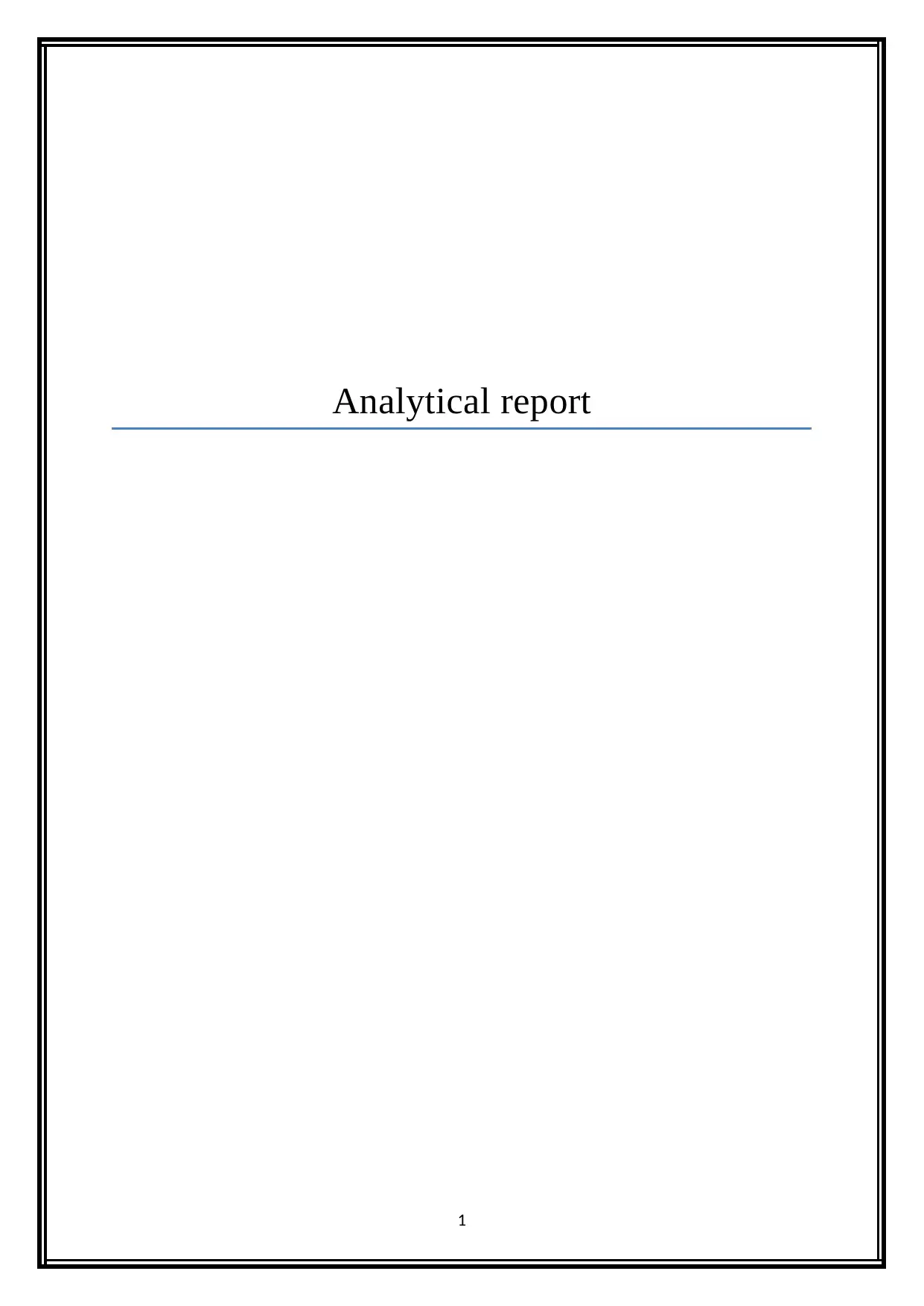
Analytical report
1
1
Secure Best Marks with AI Grader
Need help grading? Try our AI Grader for instant feedback on your assignments.
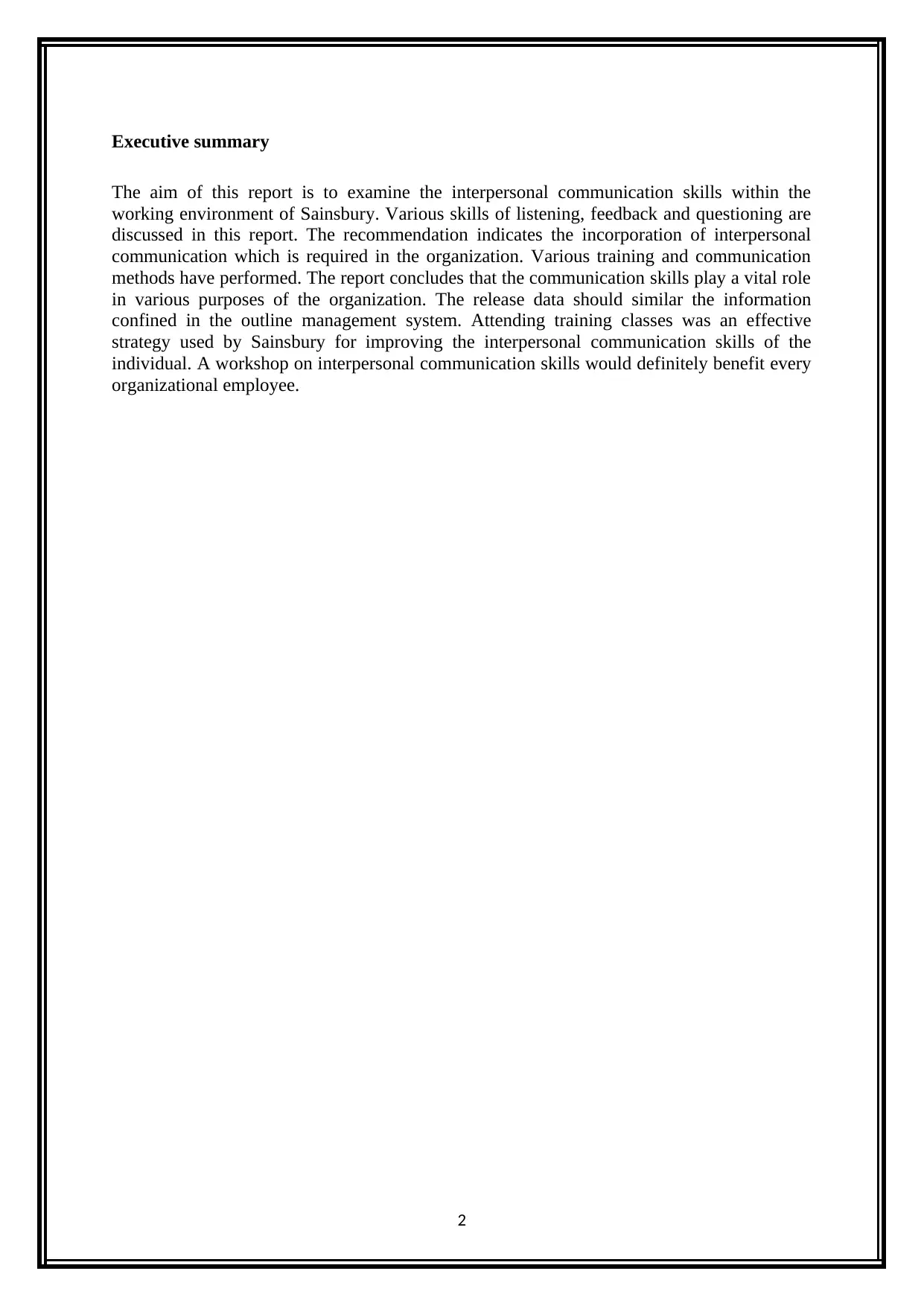
Executive summary
The aim of this report is to examine the interpersonal communication skills within the
working environment of Sainsbury. Various skills of listening, feedback and questioning are
discussed in this report. The recommendation indicates the incorporation of interpersonal
communication which is required in the organization. Various training and communication
methods have performed. The report concludes that the communication skills play a vital role
in various purposes of the organization. The release data should similar the information
confined in the outline management system. Attending training classes was an effective
strategy used by Sainsbury for improving the interpersonal communication skills of the
individual. A workshop on interpersonal communication skills would definitely benefit every
organizational employee.
2
The aim of this report is to examine the interpersonal communication skills within the
working environment of Sainsbury. Various skills of listening, feedback and questioning are
discussed in this report. The recommendation indicates the incorporation of interpersonal
communication which is required in the organization. Various training and communication
methods have performed. The report concludes that the communication skills play a vital role
in various purposes of the organization. The release data should similar the information
confined in the outline management system. Attending training classes was an effective
strategy used by Sainsbury for improving the interpersonal communication skills of the
individual. A workshop on interpersonal communication skills would definitely benefit every
organizational employee.
2
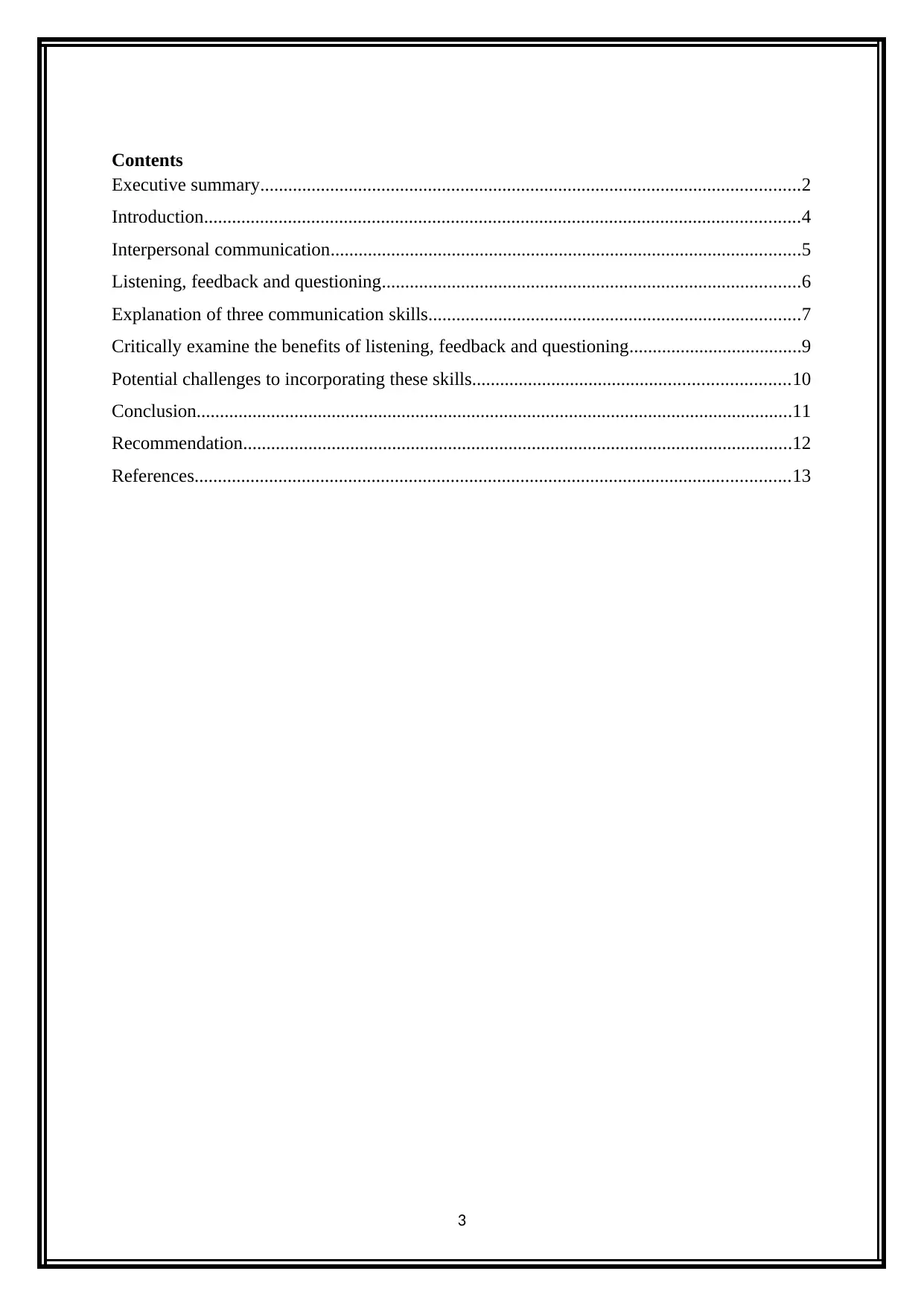
Contents
Executive summary....................................................................................................................2
Introduction................................................................................................................................4
Interpersonal communication.....................................................................................................5
Listening, feedback and questioning..........................................................................................6
Explanation of three communication skills................................................................................7
Critically examine the benefits of listening, feedback and questioning.....................................9
Potential challenges to incorporating these skills....................................................................10
Conclusion................................................................................................................................11
Recommendation......................................................................................................................12
References................................................................................................................................13
3
Executive summary....................................................................................................................2
Introduction................................................................................................................................4
Interpersonal communication.....................................................................................................5
Listening, feedback and questioning..........................................................................................6
Explanation of three communication skills................................................................................7
Critically examine the benefits of listening, feedback and questioning.....................................9
Potential challenges to incorporating these skills....................................................................10
Conclusion................................................................................................................................11
Recommendation......................................................................................................................12
References................................................................................................................................13
3
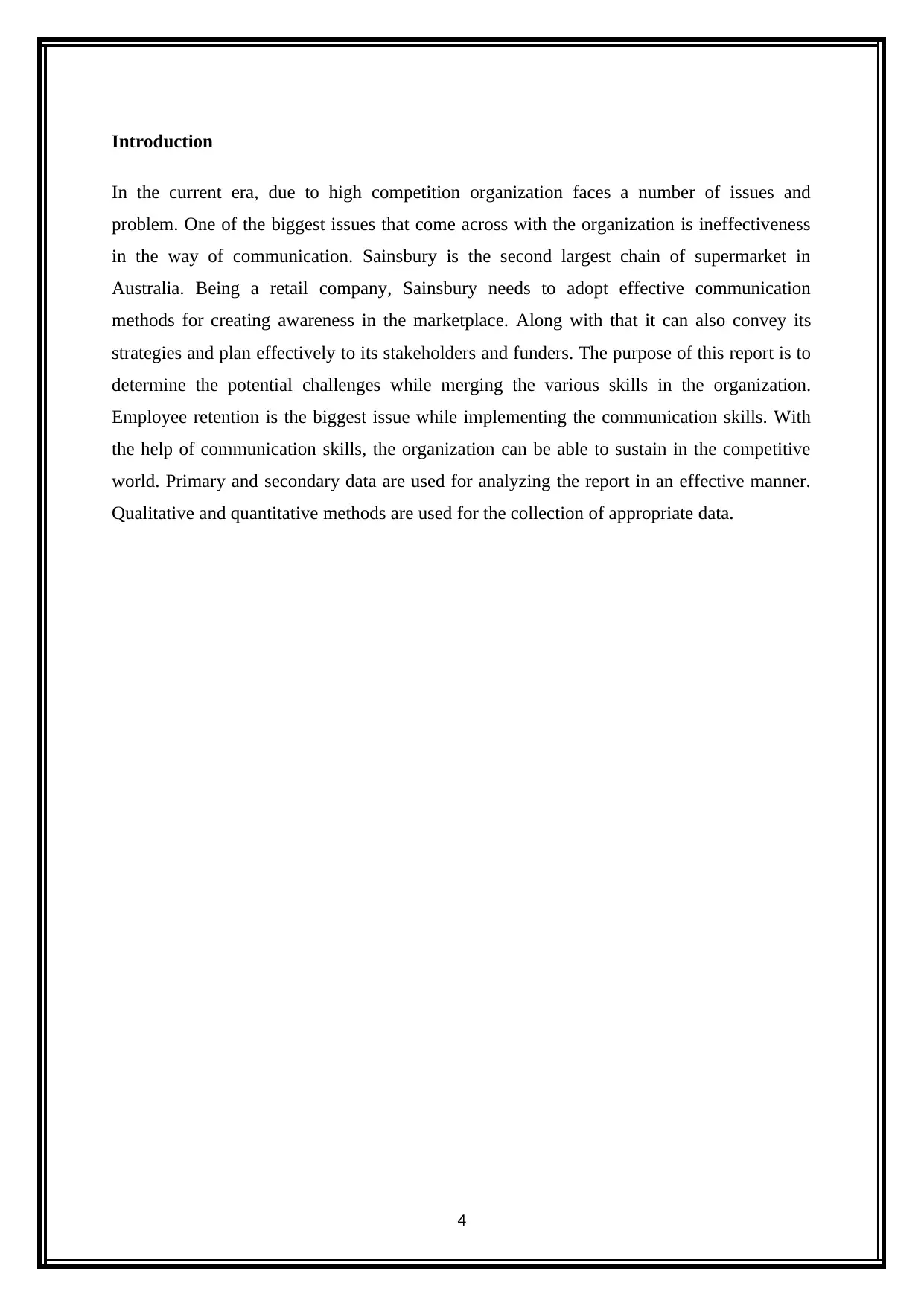
Introduction
In the current era, due to high competition organization faces a number of issues and
problem. One of the biggest issues that come across with the organization is ineffectiveness
in the way of communication. Sainsbury is the second largest chain of supermarket in
Australia. Being a retail company, Sainsbury needs to adopt effective communication
methods for creating awareness in the marketplace. Along with that it can also convey its
strategies and plan effectively to its stakeholders and funders. The purpose of this report is to
determine the potential challenges while merging the various skills in the organization.
Employee retention is the biggest issue while implementing the communication skills. With
the help of communication skills, the organization can be able to sustain in the competitive
world. Primary and secondary data are used for analyzing the report in an effective manner.
Qualitative and quantitative methods are used for the collection of appropriate data.
4
In the current era, due to high competition organization faces a number of issues and
problem. One of the biggest issues that come across with the organization is ineffectiveness
in the way of communication. Sainsbury is the second largest chain of supermarket in
Australia. Being a retail company, Sainsbury needs to adopt effective communication
methods for creating awareness in the marketplace. Along with that it can also convey its
strategies and plan effectively to its stakeholders and funders. The purpose of this report is to
determine the potential challenges while merging the various skills in the organization.
Employee retention is the biggest issue while implementing the communication skills. With
the help of communication skills, the organization can be able to sustain in the competitive
world. Primary and secondary data are used for analyzing the report in an effective manner.
Qualitative and quantitative methods are used for the collection of appropriate data.
4
Secure Best Marks with AI Grader
Need help grading? Try our AI Grader for instant feedback on your assignments.
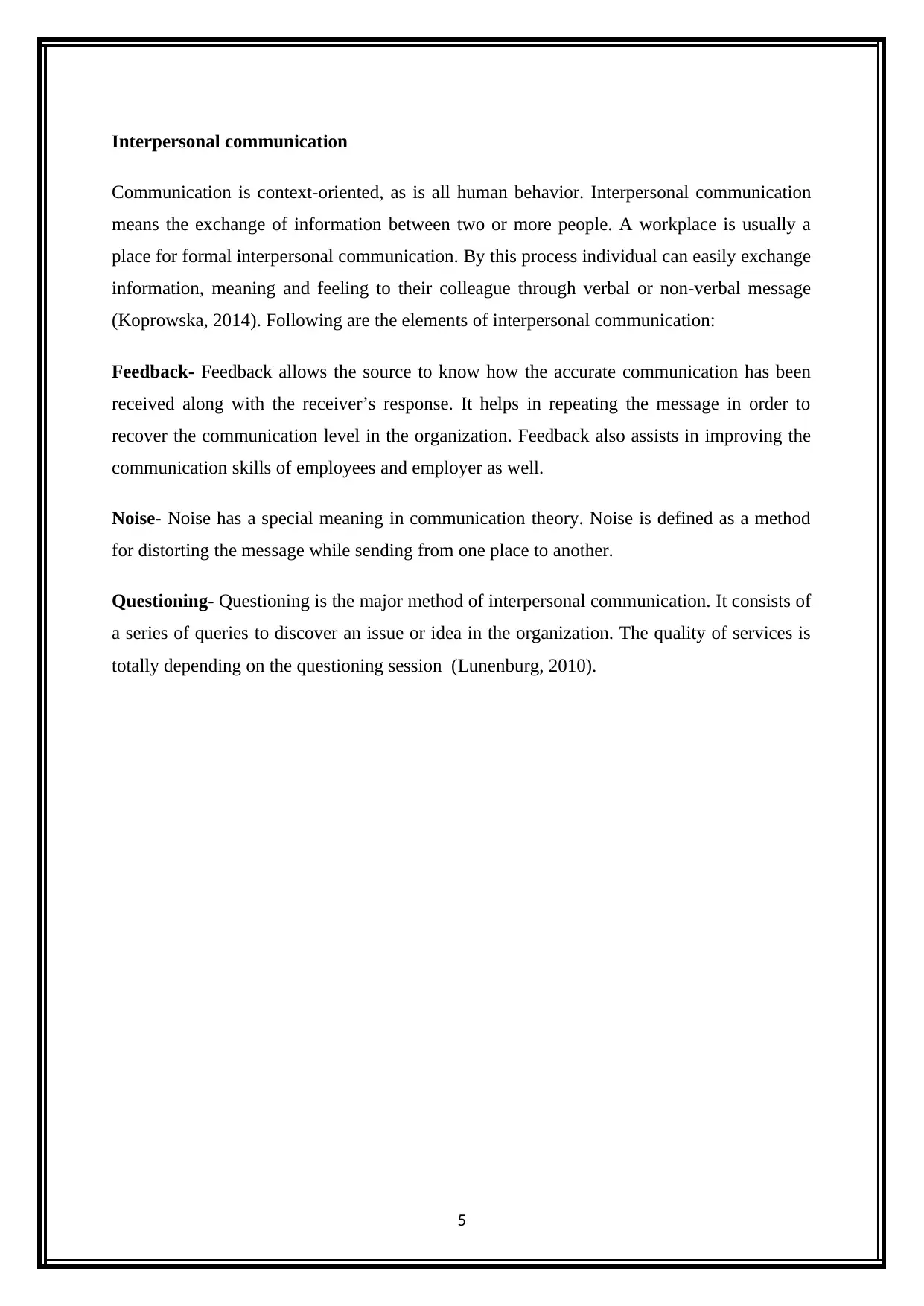
Interpersonal communication
Communication is context-oriented, as is all human behavior. Interpersonal communication
means the exchange of information between two or more people. A workplace is usually a
place for formal interpersonal communication. By this process individual can easily exchange
information, meaning and feeling to their colleague through verbal or non-verbal message
(Koprowska, 2014). Following are the elements of interpersonal communication:
Feedback- Feedback allows the source to know how the accurate communication has been
received along with the receiver’s response. It helps in repeating the message in order to
recover the communication level in the organization. Feedback also assists in improving the
communication skills of employees and employer as well.
Noise- Noise has a special meaning in communication theory. Noise is defined as a method
for distorting the message while sending from one place to another.
Questioning- Questioning is the major method of interpersonal communication. It consists of
a series of queries to discover an issue or idea in the organization. The quality of services is
totally depending on the questioning session (Lunenburg, 2010).
5
Communication is context-oriented, as is all human behavior. Interpersonal communication
means the exchange of information between two or more people. A workplace is usually a
place for formal interpersonal communication. By this process individual can easily exchange
information, meaning and feeling to their colleague through verbal or non-verbal message
(Koprowska, 2014). Following are the elements of interpersonal communication:
Feedback- Feedback allows the source to know how the accurate communication has been
received along with the receiver’s response. It helps in repeating the message in order to
recover the communication level in the organization. Feedback also assists in improving the
communication skills of employees and employer as well.
Noise- Noise has a special meaning in communication theory. Noise is defined as a method
for distorting the message while sending from one place to another.
Questioning- Questioning is the major method of interpersonal communication. It consists of
a series of queries to discover an issue or idea in the organization. The quality of services is
totally depending on the questioning session (Lunenburg, 2010).
5
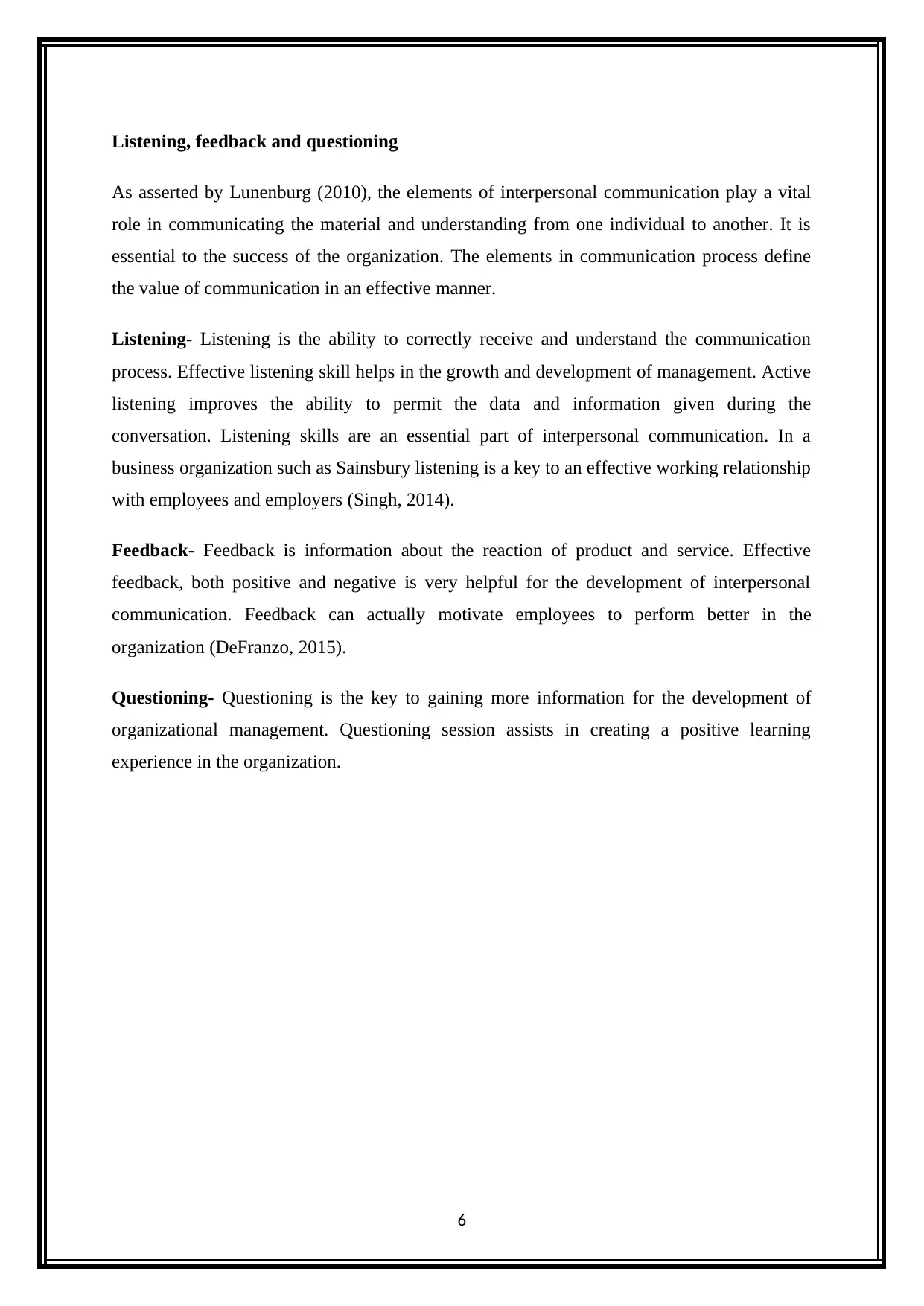
Listening, feedback and questioning
As asserted by Lunenburg (2010), the elements of interpersonal communication play a vital
role in communicating the material and understanding from one individual to another. It is
essential to the success of the organization. The elements in communication process define
the value of communication in an effective manner.
Listening- Listening is the ability to correctly receive and understand the communication
process. Effective listening skill helps in the growth and development of management. Active
listening improves the ability to permit the data and information given during the
conversation. Listening skills are an essential part of interpersonal communication. In a
business organization such as Sainsbury listening is a key to an effective working relationship
with employees and employers (Singh, 2014).
Feedback- Feedback is information about the reaction of product and service. Effective
feedback, both positive and negative is very helpful for the development of interpersonal
communication. Feedback can actually motivate employees to perform better in the
organization (DeFranzo, 2015).
Questioning- Questioning is the key to gaining more information for the development of
organizational management. Questioning session assists in creating a positive learning
experience in the organization.
6
As asserted by Lunenburg (2010), the elements of interpersonal communication play a vital
role in communicating the material and understanding from one individual to another. It is
essential to the success of the organization. The elements in communication process define
the value of communication in an effective manner.
Listening- Listening is the ability to correctly receive and understand the communication
process. Effective listening skill helps in the growth and development of management. Active
listening improves the ability to permit the data and information given during the
conversation. Listening skills are an essential part of interpersonal communication. In a
business organization such as Sainsbury listening is a key to an effective working relationship
with employees and employers (Singh, 2014).
Feedback- Feedback is information about the reaction of product and service. Effective
feedback, both positive and negative is very helpful for the development of interpersonal
communication. Feedback can actually motivate employees to perform better in the
organization (DeFranzo, 2015).
Questioning- Questioning is the key to gaining more information for the development of
organizational management. Questioning session assists in creating a positive learning
experience in the organization.
6
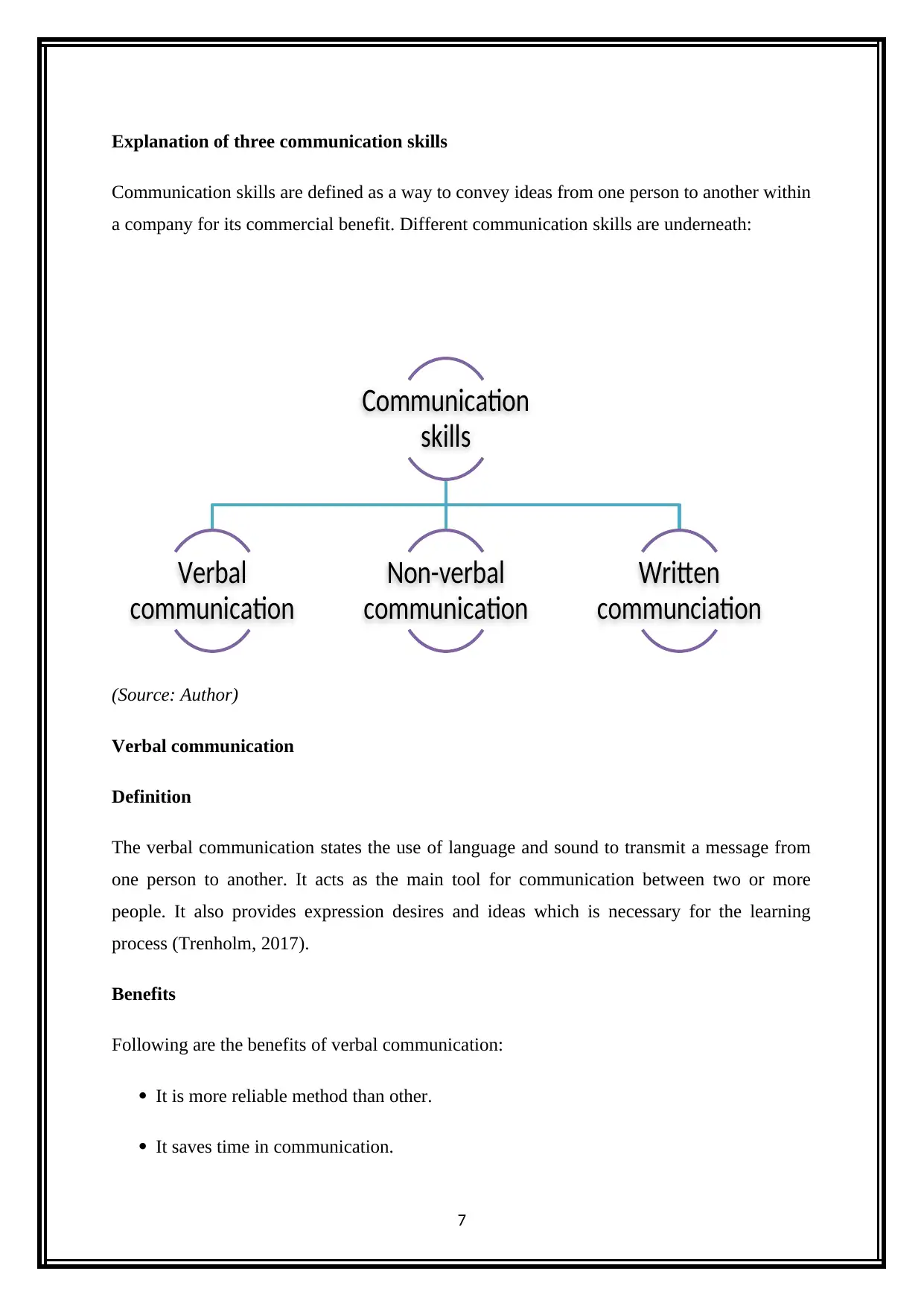
Explanation of three communication skills
Communication skills are defined as a way to convey ideas from one person to another within
a company for its commercial benefit. Different communication skills are underneath:
(Source: Author)
Verbal communication
Definition
The verbal communication states the use of language and sound to transmit a message from
one person to another. It acts as the main tool for communication between two or more
people. It also provides expression desires and ideas which is necessary for the learning
process (Trenholm, 2017).
Benefits
Following are the benefits of verbal communication:
It is more reliable method than other.
It saves time in communication.
7
Communication
skills
Verbal
communication
Non-verbal
communication
Written
communciation
Communication skills are defined as a way to convey ideas from one person to another within
a company for its commercial benefit. Different communication skills are underneath:
(Source: Author)
Verbal communication
Definition
The verbal communication states the use of language and sound to transmit a message from
one person to another. It acts as the main tool for communication between two or more
people. It also provides expression desires and ideas which is necessary for the learning
process (Trenholm, 2017).
Benefits
Following are the benefits of verbal communication:
It is more reliable method than other.
It saves time in communication.
7
Communication
skills
Verbal
communication
Non-verbal
communication
Written
communciation
Paraphrase This Document
Need a fresh take? Get an instant paraphrase of this document with our AI Paraphraser
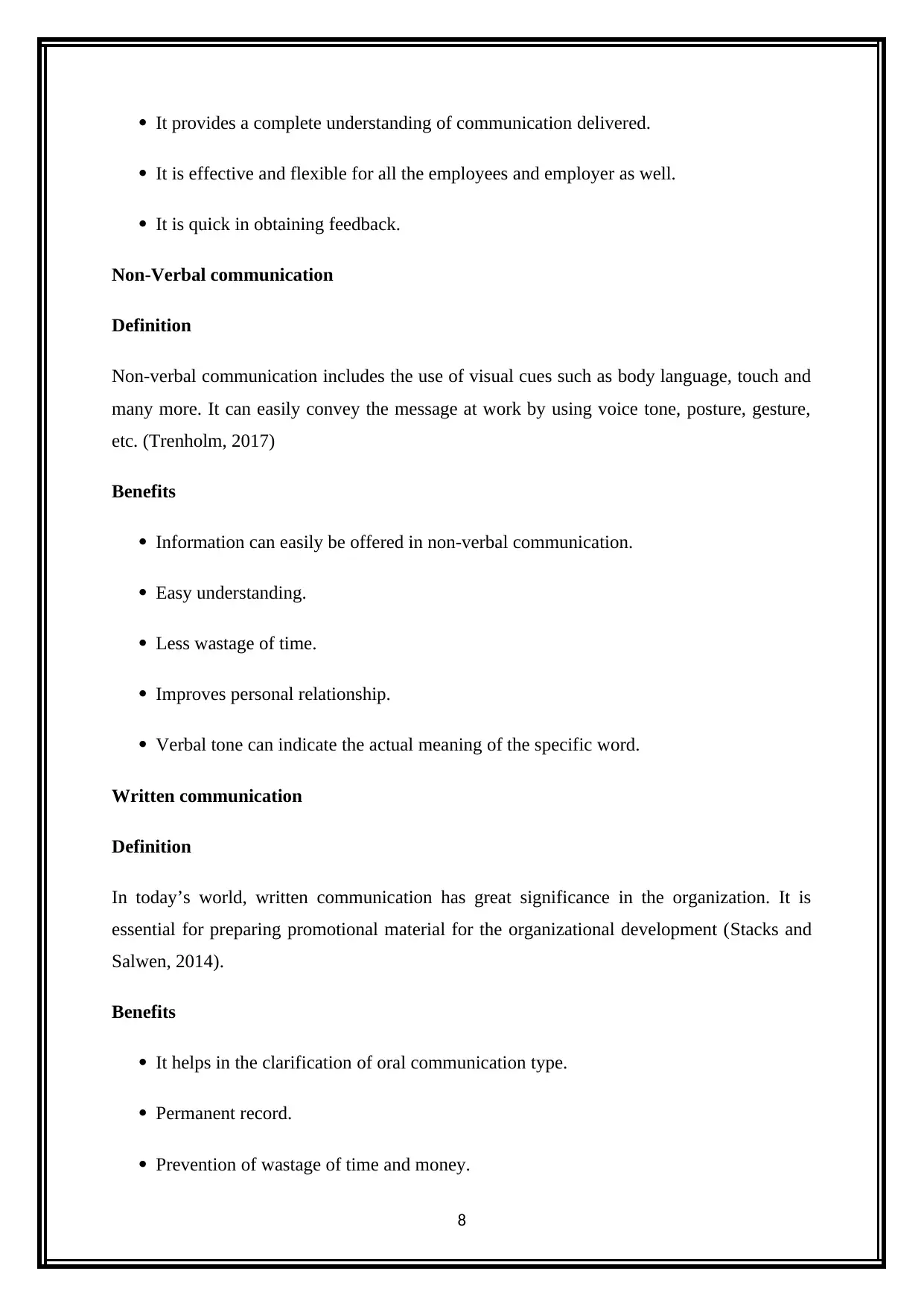
It provides a complete understanding of communication delivered.
It is effective and flexible for all the employees and employer as well.
It is quick in obtaining feedback.
Non-Verbal communication
Definition
Non-verbal communication includes the use of visual cues such as body language, touch and
many more. It can easily convey the message at work by using voice tone, posture, gesture,
etc. (Trenholm, 2017)
Benefits
Information can easily be offered in non-verbal communication.
Easy understanding.
Less wastage of time.
Improves personal relationship.
Verbal tone can indicate the actual meaning of the specific word.
Written communication
Definition
In today’s world, written communication has great significance in the organization. It is
essential for preparing promotional material for the organizational development (Stacks and
Salwen, 2014).
Benefits
It helps in the clarification of oral communication type.
Permanent record.
Prevention of wastage of time and money.
8
It is effective and flexible for all the employees and employer as well.
It is quick in obtaining feedback.
Non-Verbal communication
Definition
Non-verbal communication includes the use of visual cues such as body language, touch and
many more. It can easily convey the message at work by using voice tone, posture, gesture,
etc. (Trenholm, 2017)
Benefits
Information can easily be offered in non-verbal communication.
Easy understanding.
Less wastage of time.
Improves personal relationship.
Verbal tone can indicate the actual meaning of the specific word.
Written communication
Definition
In today’s world, written communication has great significance in the organization. It is
essential for preparing promotional material for the organizational development (Stacks and
Salwen, 2014).
Benefits
It helps in the clarification of oral communication type.
Permanent record.
Prevention of wastage of time and money.
8
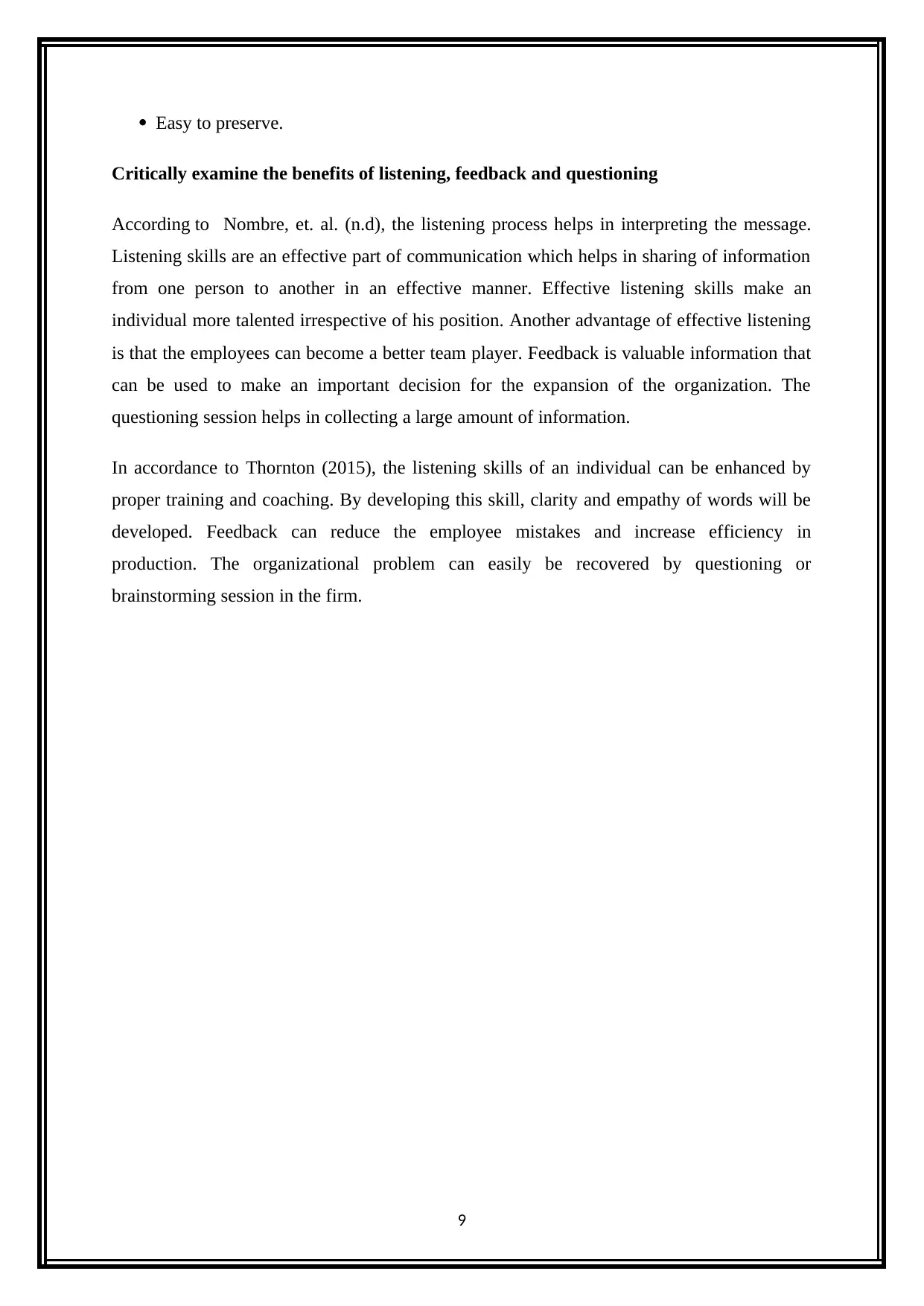
Easy to preserve.
Critically examine the benefits of listening, feedback and questioning
According to Nombre, et. al. (n.d), the listening process helps in interpreting the message.
Listening skills are an effective part of communication which helps in sharing of information
from one person to another in an effective manner. Effective listening skills make an
individual more talented irrespective of his position. Another advantage of effective listening
is that the employees can become a better team player. Feedback is valuable information that
can be used to make an important decision for the expansion of the organization. The
questioning session helps in collecting a large amount of information.
In accordance to Thornton (2015), the listening skills of an individual can be enhanced by
proper training and coaching. By developing this skill, clarity and empathy of words will be
developed. Feedback can reduce the employee mistakes and increase efficiency in
production. The organizational problem can easily be recovered by questioning or
brainstorming session in the firm.
9
Critically examine the benefits of listening, feedback and questioning
According to Nombre, et. al. (n.d), the listening process helps in interpreting the message.
Listening skills are an effective part of communication which helps in sharing of information
from one person to another in an effective manner. Effective listening skills make an
individual more talented irrespective of his position. Another advantage of effective listening
is that the employees can become a better team player. Feedback is valuable information that
can be used to make an important decision for the expansion of the organization. The
questioning session helps in collecting a large amount of information.
In accordance to Thornton (2015), the listening skills of an individual can be enhanced by
proper training and coaching. By developing this skill, clarity and empathy of words will be
developed. Feedback can reduce the employee mistakes and increase efficiency in
production. The organizational problem can easily be recovered by questioning or
brainstorming session in the firm.
9
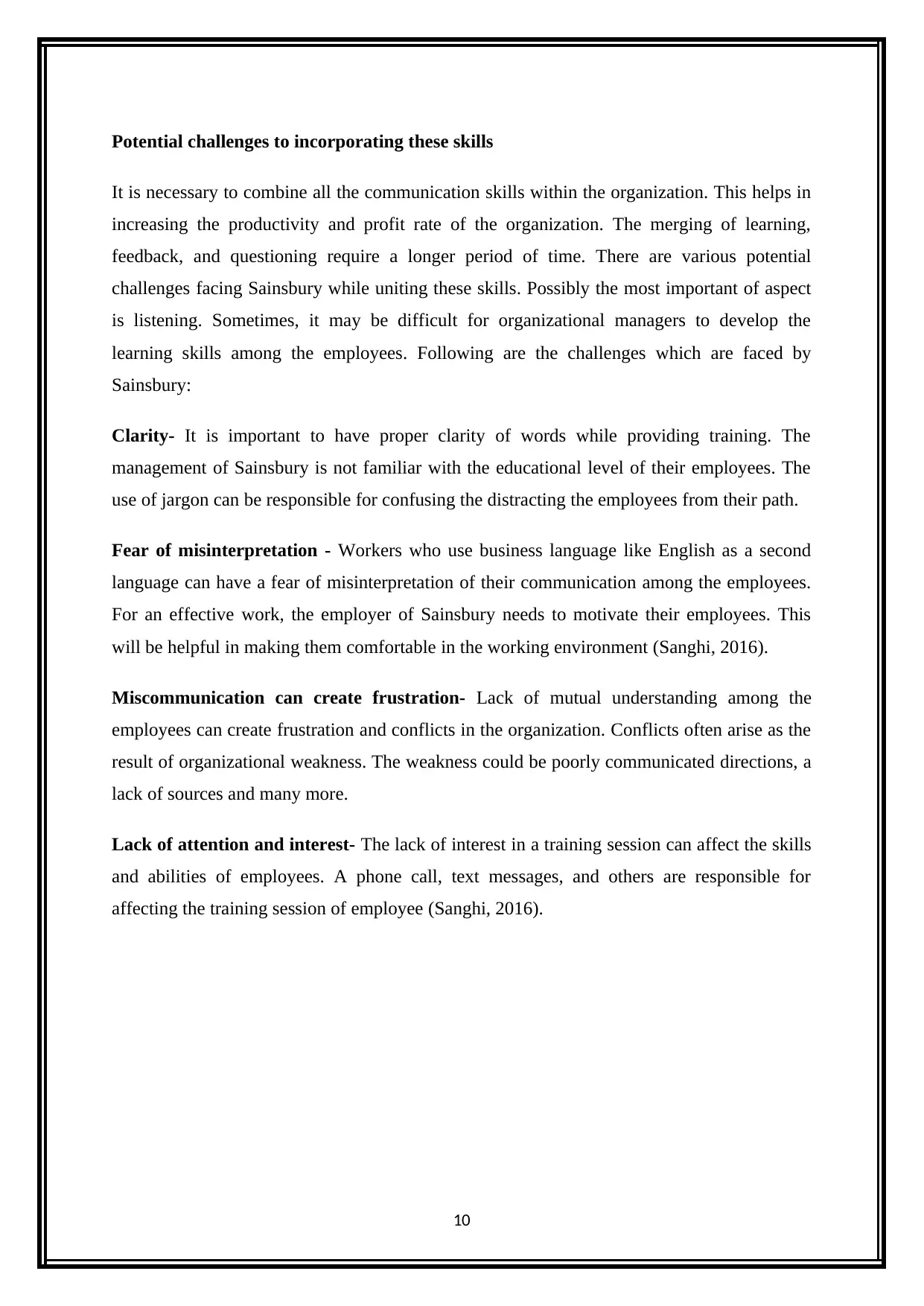
Potential challenges to incorporating these skills
It is necessary to combine all the communication skills within the organization. This helps in
increasing the productivity and profit rate of the organization. The merging of learning,
feedback, and questioning require a longer period of time. There are various potential
challenges facing Sainsbury while uniting these skills. Possibly the most important of aspect
is listening. Sometimes, it may be difficult for organizational managers to develop the
learning skills among the employees. Following are the challenges which are faced by
Sainsbury:
Clarity- It is important to have proper clarity of words while providing training. The
management of Sainsbury is not familiar with the educational level of their employees. The
use of jargon can be responsible for confusing the distracting the employees from their path.
Fear of misinterpretation - Workers who use business language like English as a second
language can have a fear of misinterpretation of their communication among the employees.
For an effective work, the employer of Sainsbury needs to motivate their employees. This
will be helpful in making them comfortable in the working environment (Sanghi, 2016).
Miscommunication can create frustration- Lack of mutual understanding among the
employees can create frustration and conflicts in the organization. Conflicts often arise as the
result of organizational weakness. The weakness could be poorly communicated directions, a
lack of sources and many more.
Lack of attention and interest- The lack of interest in a training session can affect the skills
and abilities of employees. A phone call, text messages, and others are responsible for
affecting the training session of employee (Sanghi, 2016).
10
It is necessary to combine all the communication skills within the organization. This helps in
increasing the productivity and profit rate of the organization. The merging of learning,
feedback, and questioning require a longer period of time. There are various potential
challenges facing Sainsbury while uniting these skills. Possibly the most important of aspect
is listening. Sometimes, it may be difficult for organizational managers to develop the
learning skills among the employees. Following are the challenges which are faced by
Sainsbury:
Clarity- It is important to have proper clarity of words while providing training. The
management of Sainsbury is not familiar with the educational level of their employees. The
use of jargon can be responsible for confusing the distracting the employees from their path.
Fear of misinterpretation - Workers who use business language like English as a second
language can have a fear of misinterpretation of their communication among the employees.
For an effective work, the employer of Sainsbury needs to motivate their employees. This
will be helpful in making them comfortable in the working environment (Sanghi, 2016).
Miscommunication can create frustration- Lack of mutual understanding among the
employees can create frustration and conflicts in the organization. Conflicts often arise as the
result of organizational weakness. The weakness could be poorly communicated directions, a
lack of sources and many more.
Lack of attention and interest- The lack of interest in a training session can affect the skills
and abilities of employees. A phone call, text messages, and others are responsible for
affecting the training session of employee (Sanghi, 2016).
10
Secure Best Marks with AI Grader
Need help grading? Try our AI Grader for instant feedback on your assignments.
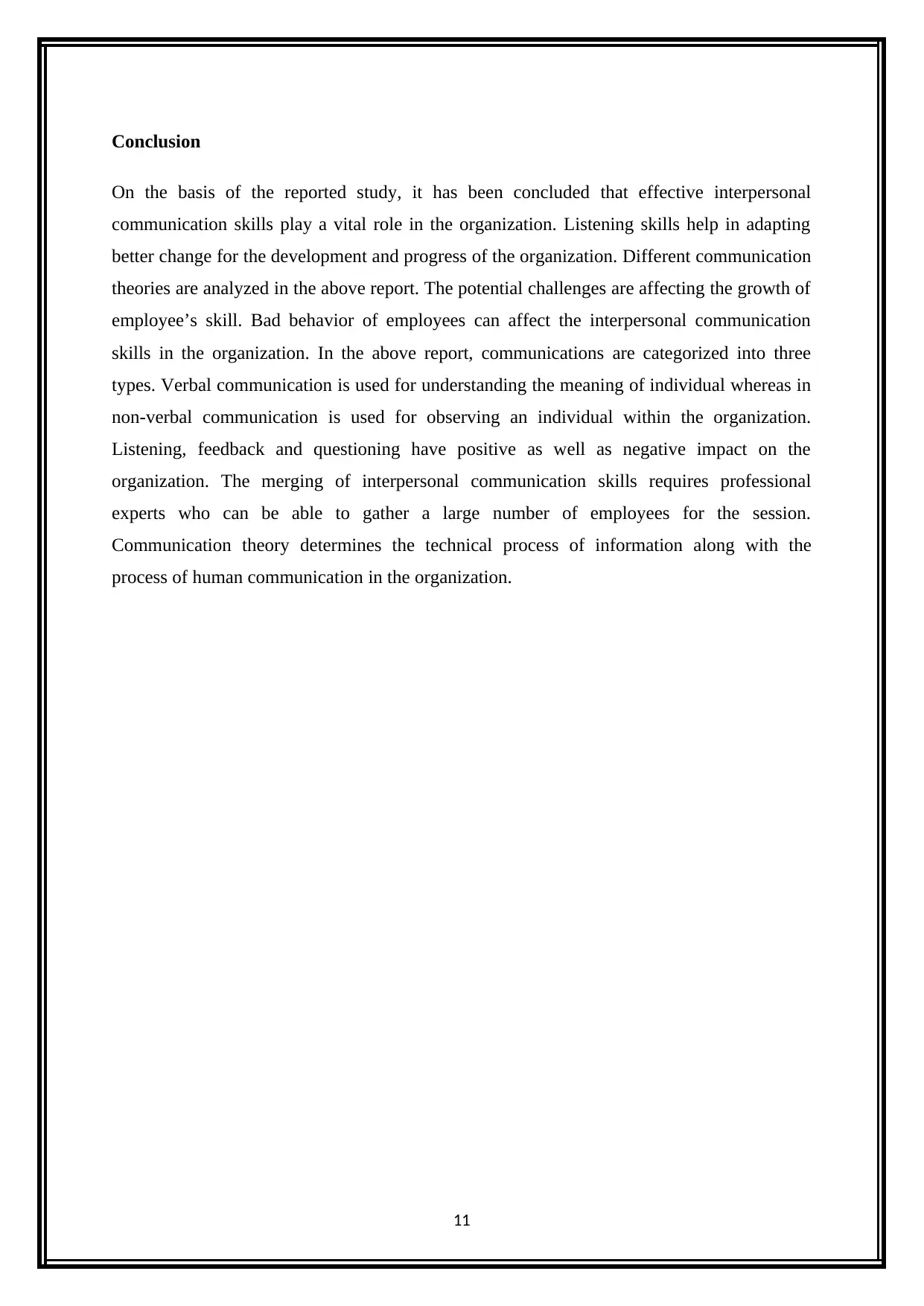
Conclusion
On the basis of the reported study, it has been concluded that effective interpersonal
communication skills play a vital role in the organization. Listening skills help in adapting
better change for the development and progress of the organization. Different communication
theories are analyzed in the above report. The potential challenges are affecting the growth of
employee’s skill. Bad behavior of employees can affect the interpersonal communication
skills in the organization. In the above report, communications are categorized into three
types. Verbal communication is used for understanding the meaning of individual whereas in
non-verbal communication is used for observing an individual within the organization.
Listening, feedback and questioning have positive as well as negative impact on the
organization. The merging of interpersonal communication skills requires professional
experts who can be able to gather a large number of employees for the session.
Communication theory determines the technical process of information along with the
process of human communication in the organization.
11
On the basis of the reported study, it has been concluded that effective interpersonal
communication skills play a vital role in the organization. Listening skills help in adapting
better change for the development and progress of the organization. Different communication
theories are analyzed in the above report. The potential challenges are affecting the growth of
employee’s skill. Bad behavior of employees can affect the interpersonal communication
skills in the organization. In the above report, communications are categorized into three
types. Verbal communication is used for understanding the meaning of individual whereas in
non-verbal communication is used for observing an individual within the organization.
Listening, feedback and questioning have positive as well as negative impact on the
organization. The merging of interpersonal communication skills requires professional
experts who can be able to gather a large number of employees for the session.
Communication theory determines the technical process of information along with the
process of human communication in the organization.
11
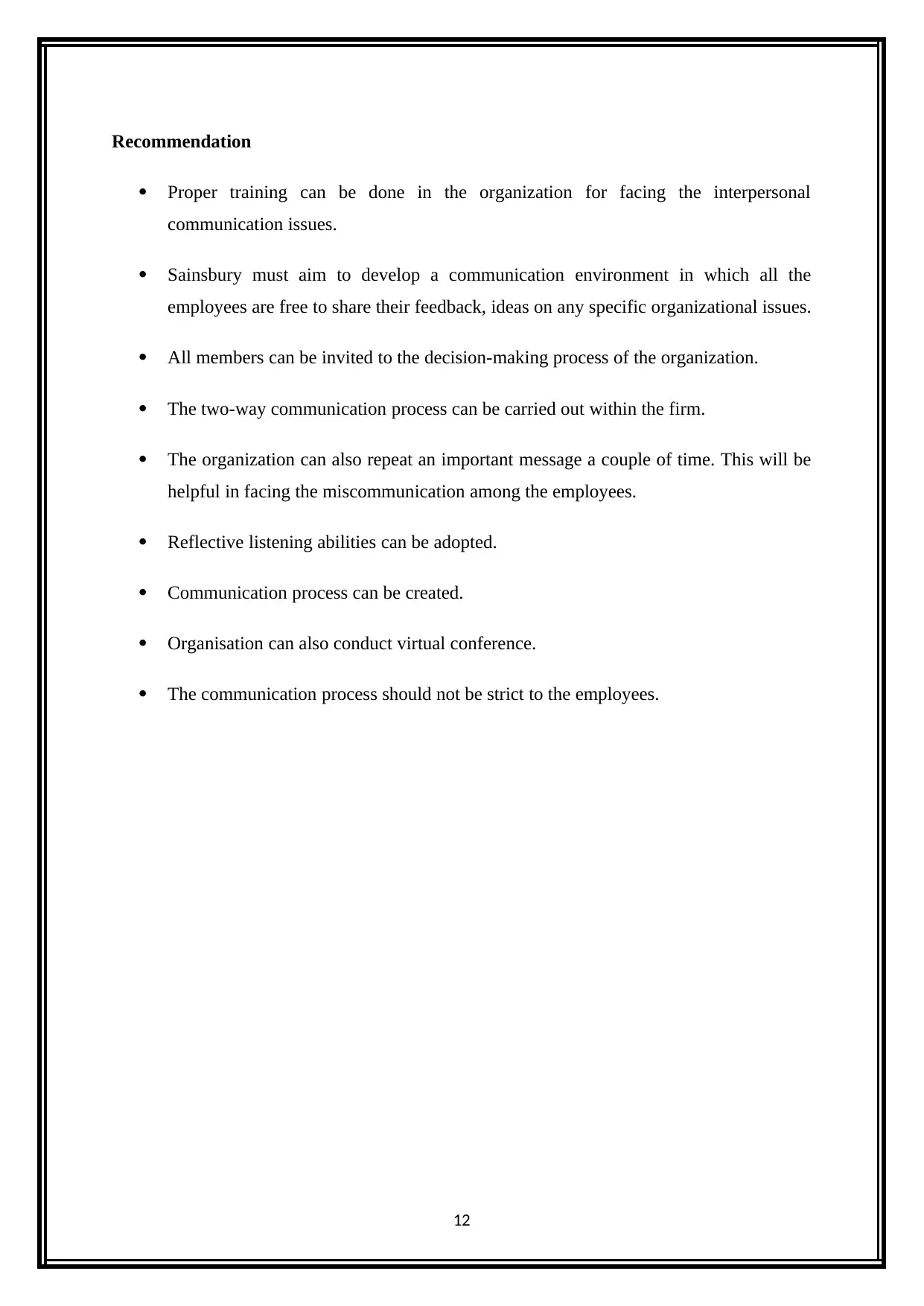
Recommendation
Proper training can be done in the organization for facing the interpersonal
communication issues.
Sainsbury must aim to develop a communication environment in which all the
employees are free to share their feedback, ideas on any specific organizational issues.
All members can be invited to the decision-making process of the organization.
The two-way communication process can be carried out within the firm.
The organization can also repeat an important message a couple of time. This will be
helpful in facing the miscommunication among the employees.
Reflective listening abilities can be adopted.
Communication process can be created.
Organisation can also conduct virtual conference.
The communication process should not be strict to the employees.
12
Proper training can be done in the organization for facing the interpersonal
communication issues.
Sainsbury must aim to develop a communication environment in which all the
employees are free to share their feedback, ideas on any specific organizational issues.
All members can be invited to the decision-making process of the organization.
The two-way communication process can be carried out within the firm.
The organization can also repeat an important message a couple of time. This will be
helpful in facing the miscommunication among the employees.
Reflective listening abilities can be adopted.
Communication process can be created.
Organisation can also conduct virtual conference.
The communication process should not be strict to the employees.
12
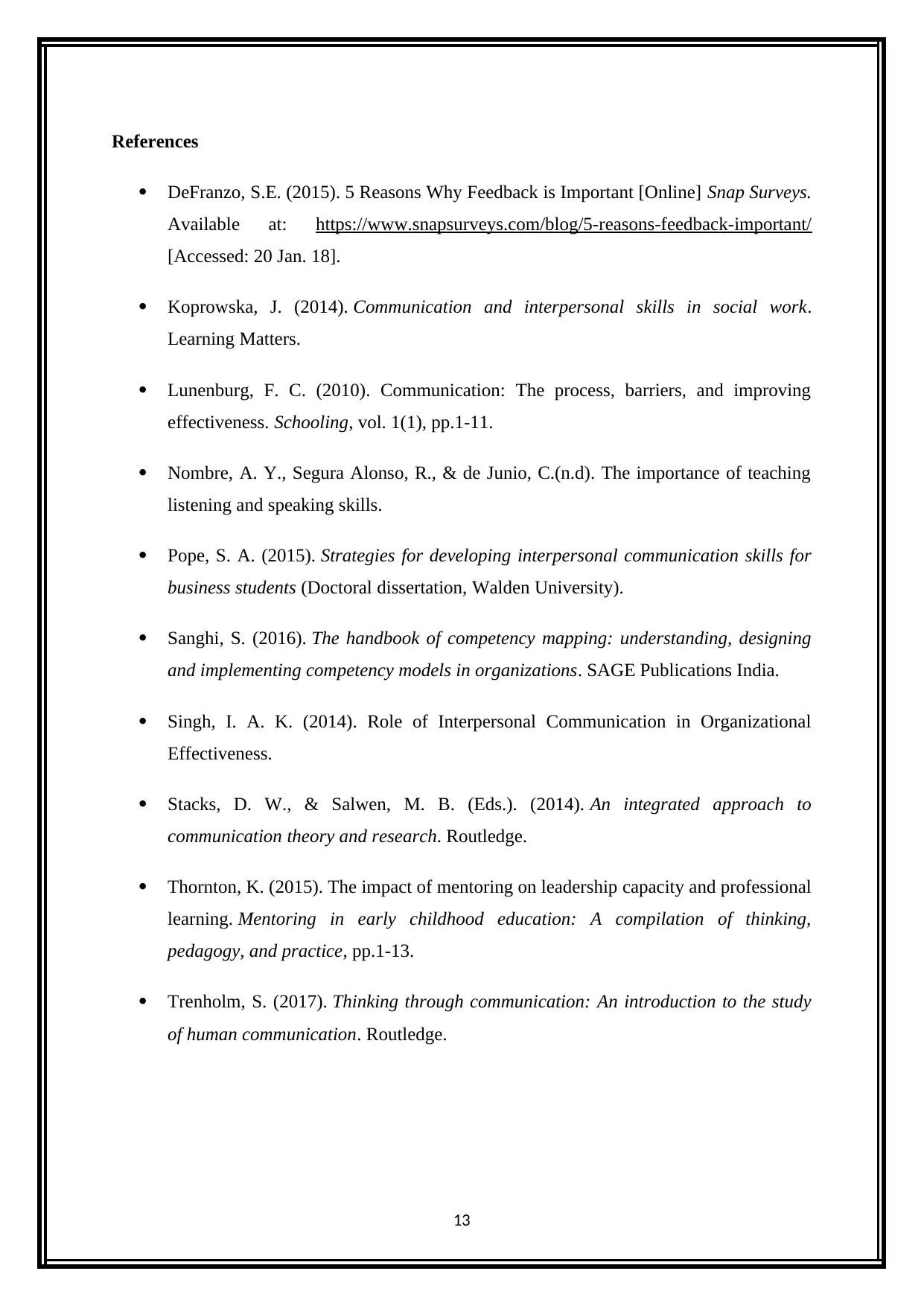
References
DeFranzo, S.E. (2015). 5 Reasons Why Feedback is Important [Online] Snap Surveys.
Available at: https://www.snapsurveys.com/blog/5-reasons-feedback-important/
[Accessed: 20 Jan. 18].
Koprowska, J. (2014). Communication and interpersonal skills in social work.
Learning Matters.
Lunenburg, F. C. (2010). Communication: The process, barriers, and improving
effectiveness. Schooling, vol. 1(1), pp.1-11.
Nombre, A. Y., Segura Alonso, R., & de Junio, C.(n.d). The importance of teaching
listening and speaking skills.
Pope, S. A. (2015). Strategies for developing interpersonal communication skills for
business students (Doctoral dissertation, Walden University).
Sanghi, S. (2016). The handbook of competency mapping: understanding, designing
and implementing competency models in organizations. SAGE Publications India.
Singh, I. A. K. (2014). Role of Interpersonal Communication in Organizational
Effectiveness.
Stacks, D. W., & Salwen, M. B. (Eds.). (2014). An integrated approach to
communication theory and research. Routledge.
Thornton, K. (2015). The impact of mentoring on leadership capacity and professional
learning. Mentoring in early childhood education: A compilation of thinking,
pedagogy, and practice, pp.1-13.
Trenholm, S. (2017). Thinking through communication: An introduction to the study
of human communication. Routledge.
13
DeFranzo, S.E. (2015). 5 Reasons Why Feedback is Important [Online] Snap Surveys.
Available at: https://www.snapsurveys.com/blog/5-reasons-feedback-important/
[Accessed: 20 Jan. 18].
Koprowska, J. (2014). Communication and interpersonal skills in social work.
Learning Matters.
Lunenburg, F. C. (2010). Communication: The process, barriers, and improving
effectiveness. Schooling, vol. 1(1), pp.1-11.
Nombre, A. Y., Segura Alonso, R., & de Junio, C.(n.d). The importance of teaching
listening and speaking skills.
Pope, S. A. (2015). Strategies for developing interpersonal communication skills for
business students (Doctoral dissertation, Walden University).
Sanghi, S. (2016). The handbook of competency mapping: understanding, designing
and implementing competency models in organizations. SAGE Publications India.
Singh, I. A. K. (2014). Role of Interpersonal Communication in Organizational
Effectiveness.
Stacks, D. W., & Salwen, M. B. (Eds.). (2014). An integrated approach to
communication theory and research. Routledge.
Thornton, K. (2015). The impact of mentoring on leadership capacity and professional
learning. Mentoring in early childhood education: A compilation of thinking,
pedagogy, and practice, pp.1-13.
Trenholm, S. (2017). Thinking through communication: An introduction to the study
of human communication. Routledge.
13
1 out of 13
Related Documents
Your All-in-One AI-Powered Toolkit for Academic Success.
+13062052269
info@desklib.com
Available 24*7 on WhatsApp / Email
![[object Object]](/_next/static/media/star-bottom.7253800d.svg)
Unlock your academic potential
© 2024 | Zucol Services PVT LTD | All rights reserved.




